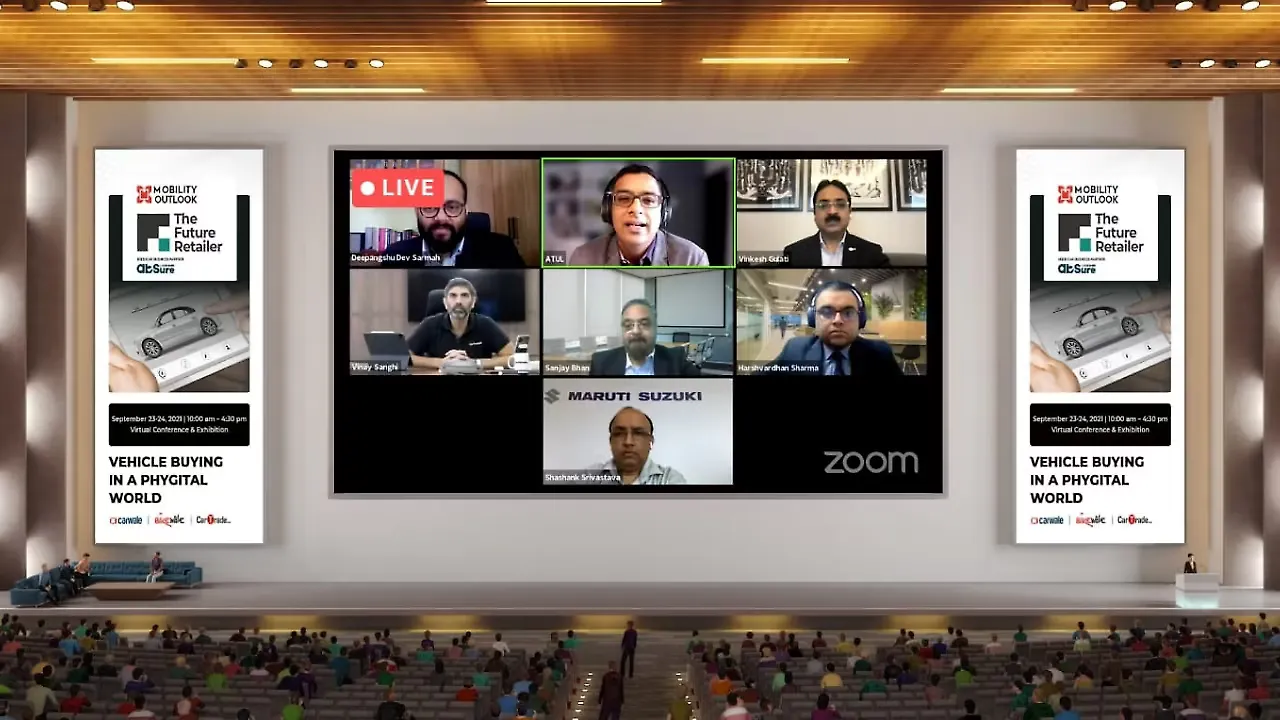
There will be a tectonic shift in the car buying process towards digital, influenced by demographics, technology, edge computing, connectivity and global convergence. However, the physical dealership will continue to exist, Shashank Srivastava, Executive Director (Sales & Marketing), Maruti Suzuki India, has said.
Delivering his address at the webinar on The Future Retailer with a theme ‘Vehicle Buying in a Phygital World,’ organised by Mobility Outlook, Srivastava said the physical dealerships would be reimagined and reinvented as experiential centres to create a unique customer experience and brand loyalists.
Talking about the role of dealerships in the digital world, he said consumers still prefer physical interactions even though they want to buy from OEM dealerships.
He said that multi-format, multi-channel, and multi-dimensional dealerships would survive and thrive depending on the consumer product and geography. Even though 24 of the 26 customer touchpoints in the buying process have been connected digitally, he said it is insufficient considering the current scenario.
The future of automobile dealerships is digital-first, said Sanjay Bhan, Head – Global Business, Hero MotoCorp. Therefore, the dealership model of the future need to change, which does not imply that dealers will get replaced, but they will have a different role to play.
“The whole change about phygital is right now happening; what we should be discussing about the future is the next level of phygital; phygital is already present, and the customers’ journey has already been altered,' Bhan said.
Talking on the finance aspect of vehicle retailing, he said that financial approvals are not based on the ability of a person to pay but his intent to pay. Psychometric tests have become the critical element for approval. The future is phygital 2.0. Currently, in phygital, the physical part is ahead of digital; it has to be reversed and therefore, the future of mobility retail has to be digital-first, and accordingly, the thinking has to be constructed, and model developed, he added.
Giving consultant's perspective, Harshvardhan Sharma, Head – Auto Retail Practice, Nomura Research Institute, said the concept of multi-brand outlets would pick pace in sales; however, the configuration of multi-brand outlets in India will differ from the global business model. This will help OEMs enhance customer experience, increased penetration, organised goals and robust network. For dealers, it will be less capital intensive, increased profitability, higher exposure and data generation.
As a precursor to this, the dealership has been evolving, driven by sharpening the focus on convenience, personalisation, innovation, digitalisation, and an evolving customer are the critical drivers for the evolution and transformation of dealerships.
According to him, the different phases of digitalisation start with conventional dealerships followed by semi-digital, digital flagship and intelligent stores.
Electric vehicles will significantly impact dealer profitability as fewer moving parts, and lower maintenance frequency will impact workshop traffic. OEMs can play a key role in enabling dealers to adopt a hybrid of physical and digital approaches by investing in people processes and technology.
Consumer activism will be a retailer’s agenda as next-gen customers, millennials, and Gen-Z are sensitive towards gender equality, equity and inclusion. In addition, millennials and Gen-Z are increasingly becoming more sensitive towards gender equality and inclusion. Therefore, the dealership must ensure building and fostering an environment that resonates with the mindsets of the new-age customers.
Vinay Sanghi, CMD and CEO, CarTrade Tech, said macro trends such as GST, one registration number, ownership sharing, leasing and digital transformation drive the auto industry. Every physical company is trying to get digital, and, ironically, every digital company is trying to partner with physical. He insisted that everyone must work in partnership to make this phygital experience possible for all consumers. He expressed his optimism for massive growth for the auto industry during the next ten to 15 years, as the industry has already begun bouncing back and moving to digital format. Personal ownership is also driving the auto industry, he added.
Vinkesh Gulati, President, Federation of Automobile Dealers Associations (FADA), said the apex body of automotive dealers is trying to digitalise the vehicle registration process. Insisting that the dealership formats need to be re-thought, he mooted the idea for the government to set up large auto zones on the outskirts of the cities that can double up as an experience centre, giving a reason for customers to go on a picnic and learn about vehicles, while smaller showrooms can confine to cities. It will solve many problems of dealers, OEMs and congestion in cities, he added.
Day one of the event also had two panel discussions on ‘Changing landscape of automotive retail in an evolving mobility ecosystem’ and ‘How digital is adding value to the retail ecosystem.’
Banwari Lal Sharma, Chief Executive Officer – Consumer Business, CarTrade Tech, spoke on the digitalisation of the automotive retail ecosystem while Amit Kaushik, Managing Director, Urban Science, deliberated on the future of automotive dealerships.
Day-2
On the second day of the webinar, i.e. tomorrow, there will be three panel discussions on ‘Realigning strategies to meet future retail challenges in the automotive value chain,’ ‘Unravelling the luxury vehicle market potential,’ and ‘Addressing the rapid growth of the Indian pre-owned vehicle market.’
In addition, there will be a digital session on ‘One 3D Experience Manager – Immersive Technologies for the Next Billion Auto Buyers.’
The valedictory address will be delivered by Nikunj Sanghi, Chairman, Automotive Skills Development Council (ASDC).